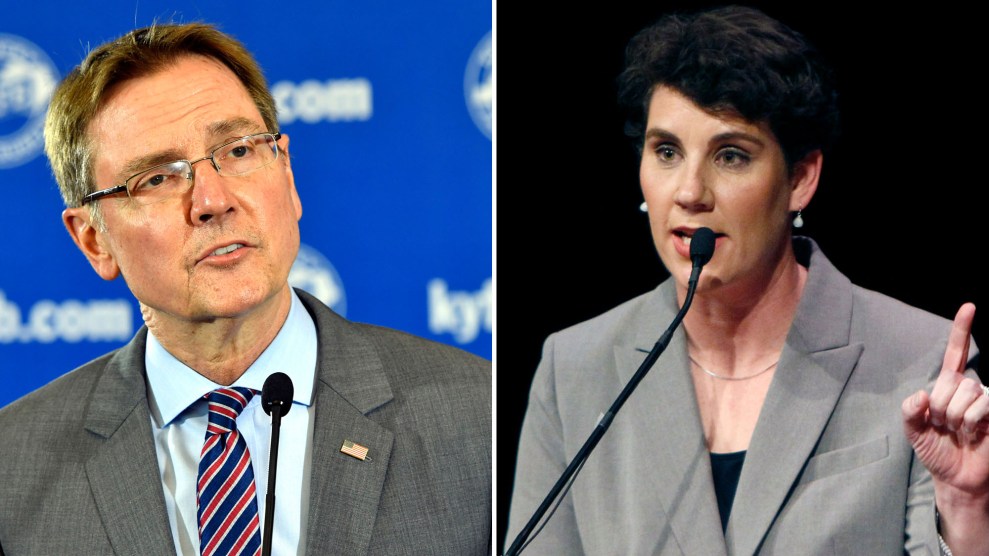
Lexington Mayor Jim Gray and former Navy pilot Amy McGrath.Timothy D. Easley/AP; Matt Goins/Lexington Herald-Leader/AP
When Amy McGrath, a former Marine fighter pilot, was first thinking about moving back to her home state of Kentucky to run for Congress after the 2016 election, she followed all the usual steps.* She wrote to former Rep. Ben Chandler, the last Democrat to win an election in the 6th District, to ask for advice. She dropped by the Kentucky Derby. And she met with the highest-profile Democrat in the district—the popular, two-term mayor of Lexington, Jim Gray.
“’You’re the man,’” McGrath recalled telling Gray when we met at her campaign office in April. “’You’re the Democrat in this area. Do you want this seat? Are you gonna run? ‘Cause if you are, I’ll do something else.’”
When Gray, who had just come off an unsuccessful US Senate race, told her no, McGrath made it official. After spending the last two decades bouncing from base to base, she bought a home outside Lexington and launched her campaign with an introductory video that went viral and helped raise nearly $1 million almost overnight. Then, last December, something happened that she wasn’t expecting—Gray, with encouragement from the Democratic Congressional Campaign Committee, decided to run anyway.
“In the military, you look people in the eye, and you’re straight with them,” she said. “In the political environment, it’s a little different. So I’m not used to that.”
The struggle between McGrath and Gray, which will come to an end with Tuesday’s Democratic primary, is emblematic of a fight playing out across the country, as first-time candidates, motivated to run for Congress by Trump’s election, have grown frustrated by national groups like the DCCC, which have their own ideas about what kinds of candidates should run. It is a problem that, at first glance, doesn’t seem like it should be a problem at all. During Obama’s second term, Democrats struggled to field even one candidate in Republican-held seats like the one McGrath and Gray are vying for. In the Trump era, the challenge is having two.
In the hierarchy of where Democrats are seriously competing in 2018, Kentucky’s 6th District is somewhere in the second or third tier. Hillary Clinton lost there by 15 points, and there’s no scandal-plagued incumbent or unexpected retirement to shake things up—Republican Rep. Andy Barr, first elected in 2014, is sitting on $2.3 million in campaign cash. But, like Pennsylvania’s 18th district, where Democrat Conor Lamb won a stunning April special election victory, the 6th District still has a lot of people who are registered Democrats, even if they’ve stopped voting that way; it’s the kind of place where, given the right climate—and the right candidate—Democrats believe they have a shot.
McGrath believes that candidate is someone like her, a newcomer with a record of military service who can open doors that might otherwise be closed to Democrats, while still firing up progressive voters who are upset about Trump—particularly women. When we met at her Lexington campaign office in April, she showed off her “party flight suit,” a commemorative one-piece uniform adorned with patches marking her service record. It included her call sign, Krusty—“my hair would stick out, and the guys thought I looked like Krusty the Clown,” she said—a Kentucky flag, and badges representing each of the 18 countries she flew missions over.
On the back, the biggest patch of them all was of a blonde woman in a short red dress, straddling a missile—the squadron’s unofficial seal. “Wasn’t a fan of Bombing Betty,” McGrath said, rolling her eyes. “I wished I could have Bombing Bob.”
McGrath’s service record has been at the center of her campaign since she entered the race with her viral introductory video, a two-minute biographical spot that doubled as a sort of superhero origin story for the resistance crowd. In the video, McGrath, in a bomber jacket, explains that she grew up wanting to “fly fighter jets and land on aircraft carriers.” At the age of 12, she wrote to her congressman, senators, and the House and Senate armed services committees, asking them to lift the prohibition on female fighter pilots. Sen. Mitch McConnell never wrote back. Other Republicans told her “no.” McGrath would get her wish, though, just before she became an Annapolis cadet, when President Bill Clinton ended the ban.
“Democrats wanted to give me a chance, and all the Republicans wanted to say, ‘No, you’re Amy, not Andy, go be a nurse,’” she told me.
The ad helped her raise more money in her first quarter of campaigning than almost any other Democratic challenger in America and landed her on set with Chelsea Handler. She picked up endorsements from Rep. Seth Moulton (D-Mass.), a former Marine who is backing a slate of Democratic veterans, and Sen. Kirsten Gillibrand (D-N.Y.).
But it wasn’t enough to convince the DCCC to back off—or back her. When Gray entered the race in December, he said it was in response to support from local party leaders and activists. And Gray, who beat his opponent, Sen. Rand Paul (R-Ky.), in the district during his Senate campaign, doesn’t suffer for friends in Lexington. But he’s also acknowledged some “encouragement” from the national organization, and the DCCC has championed Gray for putting the district “in play.”
Gray’s first TV ad, in April, didn’t have any fighter jets or aircraft carriers; instead, it featured the bespectacled, 64-year-old candidate delivering a string of folksy expressions:
“God gave us two ears and one mouth for a reason—to listen twice as much as we talk.”
“You’ve got to tackle those problems head-on…wrestle them to the ground—just like a bear.”
“When you’re solving a problem, you’ve got to start with killing the snakes closest to your feet.”
https://www.youtube.com/watch?v=IsLs9Lb8QSk
Lexington’s first-ever openly gay mayor, Gray came to politics with a large personal fortune from his family’s construction firm, which built everything from the steps descending Mammoth Cave to the Toyota plant in Georgetown, Kentucky. After being elected in 2010, he balanced budgets and helped revitalize the city’s downtown. When white supremacists rallied in Charlottesville, Virginia, in 2017, Gray announced Lexington’s Confederate monuments would be relocated to a cemetery.
“We brought a lot of people to the table,” he said. “Same model we used in pension reform, same model we used in health insurance reform, same model we used in Confederate statues—bringing people to the table, giving people a chance to express themselves, giving them their airtime.”
The “table” is the sun around which Gray’s proudly moderate politics revolve. It’s at the table where “we get problems solved,” Gray believes. The people Gray envisions at those tables are, like him, not Democrats or Republicans; they’re “problem solvers.” In a year in which progressive candidates are courting the left with ambitious proposals on health care, jobs, and justice, Gray isn’t one of them. Two of the politicians he most admires in Washington, he told me, are Mark Warner and Joe Manchin, both Democratic senators from neighboring states willing to vote against the party line, and he touts the endorsement of the conservative Blue Dog PAC.
McGrath and Gray’s platforms differ in small, barely notable ways. Gray promises to “fix” the Affordable Care Act, while McGrath supports adding a public option. Gray rejects the National Rifle Association and talks enthusiastically about tightening background checks. McGrath used to be an NRA member but now says much the same thing. “I can take on Andy Barr on guns,” she says. “I can outshoot him, for sure.”
They’re both pro-choice, but McGrath is more comfortable talking about it. “If you want to look at trying to reduce the amount of abortions, I think you ought to have safe and affordable birth control,” she says. “So the idea that the Trump administration would now take away the mandate that insurance companies cover birth control for people, I just think it’s a step in the wrong direction. Like, why? Why would you do that? I’ll tell you why you do—because you have 19 percent women in Congress.”
When I asked Gray how he’d vote on a 20-week abortion ban, which Barr has supported and McGrath rejects, he was anything but clear: “Well, I think, you know, these are issues that—health care decisions should be with the women, with the woman and, um, so that’s where I am.” So should or shouldn’t Congress pass such laws? “I think that you know, it’s not Congress’—let me come back to that,” he said. Later, when we came back to it, he said he was going to stand by his earlier answer.
Gray has said he wouldn’t support Rep. Nancy Pelosi as Democratic leader, but that it’s “too early” to say who he would back. McGrath wouldn’t commit to supporting Pelosi either. “Many people in the 6th District who are Democrats feel that the current leadership is really representing New York and San Francisco—and nowhere in between,” she says.
McGrath admits there isn’t much daylight between the two of them on issues. “It’s not so much the message; it’s the messenger,” she said. Gray is part of the “old guard,” in her view. “The Democratic Party needs a new generation of leaders. I’ve been critical of their meddling in places like Kentucky 6th, recruiting somebody who, frankly, told me he didn’t want the job. He didn’t want to run, but apparently was pushed so hard by the national party to get in. Why?”
The McGrath-Gray primary is not the only contest where national Democrats’ interventions have forced a conversation on their own unpopularity. In Texas’ 7th Congressional District, the DCCC launched a broadside against Laura Moser, a progressive activist who developed a popular resistance app. The attack, which selectively quoted a Moser essay on her home state in an effort to make her appear anti-Texan, backfired and helped her advance out of a crowded field into Tuesday’s runoff, where she faces Lizzie Fletcher, a Houston lawyer.
Last week, Kara Eastman edged former Rep. Brad Ashford in the primary for Nebraska’s 2nd District, where Ashford was seeking to reclaim his old seat with the DCCC’s support. (Eastman, like McGrath, has said she was led to believe the DCCC would not get involved in the primary.) Complaints about interventions from the DCCC’s Washington operatives have boiled over in recent weeks in places like Colorado, where one candidate, Levi Tillemann, leaked audio of a conversation he had with House Minority Whip Steny Hoyer (D-Md.) encouraging him to drop out of the race and support DCCC-backed Jason Crow.
Tuesday’s contest is wide open. Early polling gave Gray a significant edge over McGrath, but after she began running ads this spring, McGrath released two private polls showing steady gains; the last one put her squarely on top. In a sign that that the dynamic of the race had changed, Gray released a new ad in the final week of the campaign attempting to walk a fine line, praising McGrath’s service record while criticizing her for having recently moved to the district. “Shouldn’t she live here for a while before she tries to represent us?” a narrator asked. This time, it was Gray’s turn to accuse McGrath of bigfooting her way into the field.
Correction: An earlier version of this article misidentified which branch of the military McGrath served in.











